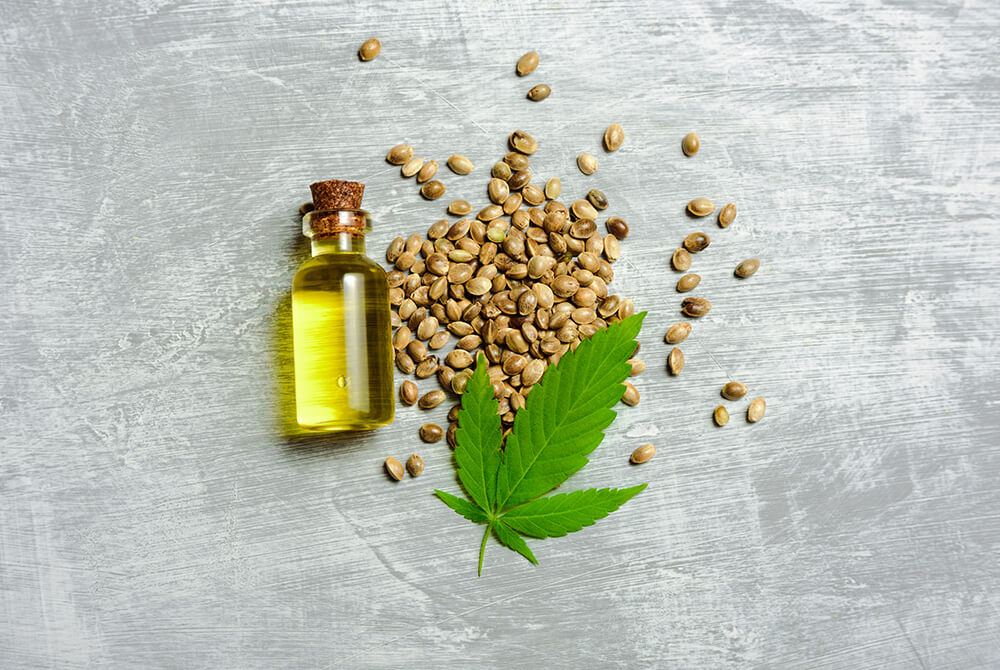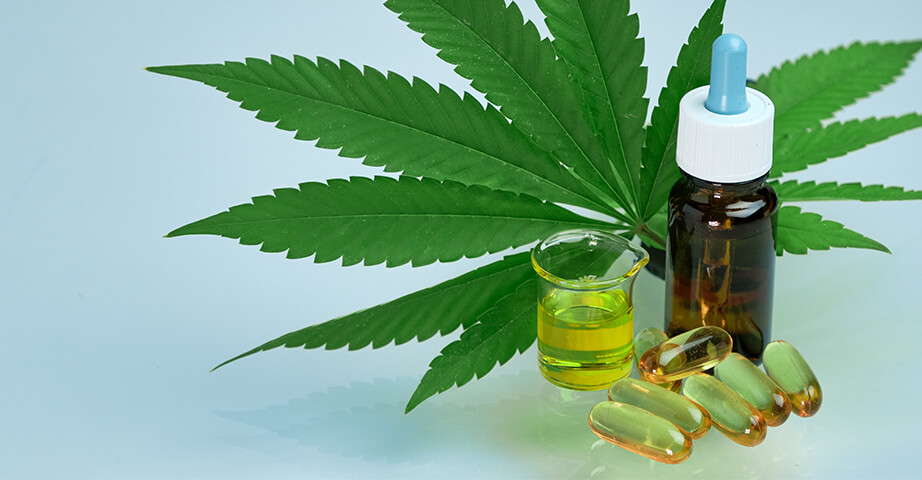Who can benefit from hemp oil? Medicinal properties, use, price.

Hemp oil, or hemp seed oil, is a completely dissimilar product to CBD oil. To use it correctly, you need to be aware of the difference. Hemp oil can be purchased in natural food shops and pharmacies. It is characterised by its excellent fatty acid composition and is one of the few sources of omega-3 fatty acids as well as GLA in food. What does hemp oil help with? How to use hemp oil? How much does it cost?
Hemp oil is not CBD oil - differences
Before we take a closer look at hemp oil, it's essential to stress that hemp oil is not the same as CBD oil. Due to its origin from the same plant -Cannabis Sativa, both oils are often mistaken with each other. What is the difference between hemp oil and CBD oil?
Hemp oil is made from the seeds of the hemp plant by cold pressing like many other cooking oils. CBD, on the other hand, is made by extracting the flowers, leaves and stems of hemp. Hemp oil does not include CBD because hemp seeds do not contain it. It has a different composition of bioactive phytochemicals with consequently various purposes and properties. It is used primarily due to its beneficial fatty acid composition and supply of essential unsaturated fatty acids from the omega-3 family.
Hemp oil is sold in larger bottles, often in BIO and natural food shops. It is also much cheaper than CBD, which you can get in small bottles with a pipette and defined CBD content on the label. The price of hemp oil varies from 15 to 30 PLN for 250 ml. More and more often, hemp oil is sold in small bottles which are very similar to CBD ones. It is just a marketing trick and an attempt to sell hemp seed oil at the price of CBD.
Recommended products with hemp oil
What does hemp seed oil contain?
Hemp seed oil is a source of essential unsaturated fatty acids (EFAs), which make up 75-80% of its total fats. Primarily, it contains omega-6 (58,7-62,9%) and omega-3 (17,2-22%). Both types are present in hemp oil in a very good ratio for health, about 3:1. The correct ratio of omega-6 to omega-3 in the human diet should oscillate around this level, while in a typical Western diet it is about 20:1. A valuable component of the hemp seed oil is the rare gamma-linolenic acid (GLA), which represents 4% of all its fatty acids.
In addition, hemp oil contains:
- vitamin E – alpha, beta, gamma and delta tocopherols are collectively known as vitamin E. In 100 ml of hemp seed oil, there are from 60 to 110 mg of them, with gamma-tocopherol being the most abundant. Gamma-tocopherol is the strongest antioxidant among the tocopherols.
- carotenoids – precursors of vitamin A. Cold-pressed oil contains 3.1 mg of carotenoids/100 g.
- phytosterols – 390-670 mg/100 g, 70% of which is beta-sitosterol with proven lipid-regulating activity,
- polyphenols – compounds with antioxidant properties. The total antioxidant potential of the hemp seed oil is higher than that of rapeseed oil and, considered one of the healthiest, flaxseed oil.
How to use hemp oil?
Hemp oil for various ailments can be taken orally, and for skin problems additionally externally. For drinking, 2 tablespoons (30 ml) of hemp seed oil are recommended daily. You can apply hemp seed oil to cotton wool and then spread it thinly over the entire face or spot apply only to blemishes. Leave the oil on the face for 2 minutes and then wash off with warm water.
A sensitisation test is recommended before applying hemp oil to the skin. Apply a small amount of oil to the skin on the forearm, wrap in bandages and leave for 24 hours. If redness, itching or other irritation does not appear during this time, it can be considered that there is no hypersensitivity to hemp oil. If changes do occur, the oil should be washed off immediately after noticing them with warm soapy water. In this situation, applying hemp oil to the face is not recommended.

Hemp oil - health-promoting properties
The best-researched properties of hemp oil relate to its positive effects on skin conditions. Oral intake of the oil improves it in people with atopic dermatitis and eczema. The fatty acids of hemp seed oil are responsible for this effect. The use of hemp oil has also been proven to help treat psoriasis and acne. How to use hemp oil for skin problems? One scientific study showed that taking 30 ml of oil (2 tablespoons) daily for 20 weeks in people with atopic dermatitis resulted in a significant reduction in dry skin, itching and the amount of medication used. The first positive effects were visible after only 2 weeks of using hemp oil.
It is believed that due to its composition of fatty acids, hemp oil has a strengthening effect on the skin as well as reduces its permeability, dryness and susceptibility to infections. Its antioxidant properties support skin regeneration processes and reduce the impact of harmful free radicals from the environment as well as those produced by the body. As a result, hemp oil can slow down skin ageing processes.
Hemp seed oil can be used orally and externally on the skin. There are common claims that it does not clog pores, but this should be tested on the individual, especially those with mixed and oily skin. Nevertheless, hemp oil can be very valuable in dermatological treatment thanks to its antimicrobial, antioxidant and nourishing properties.
Other properties of hemp oil include:
- anti-inflammatory activity and reduction of inflammatory markers in the body,
- lowering the concentration of total cholesterol in the blood,
- anti-clotting effect,
- reducing the risk of atherosclerosis and other cardiovascular diseases,
- positive effect on the nervous system and potential role in reducing the risk of cognitive decline with age,
- a dietary component for cancer prevention,
- strengthening the immune system.
